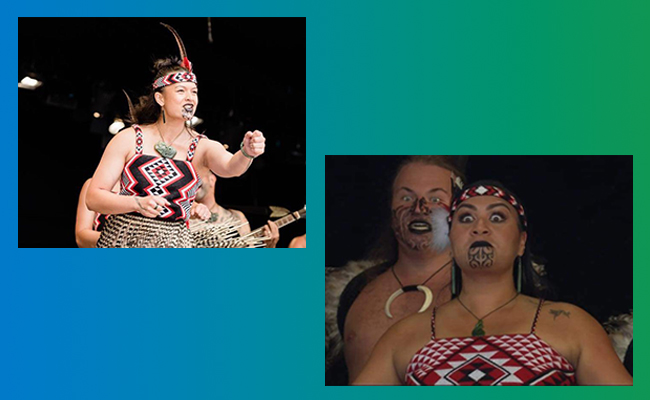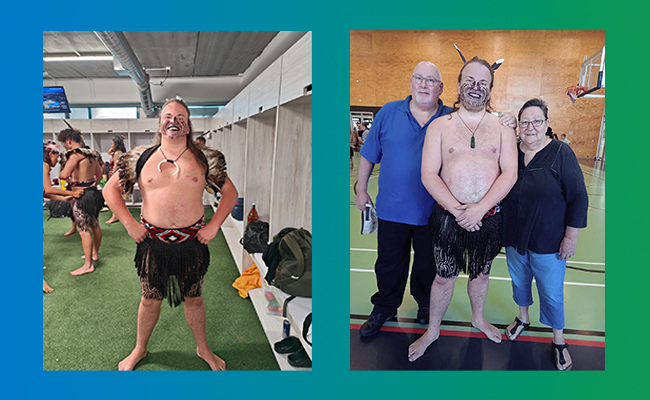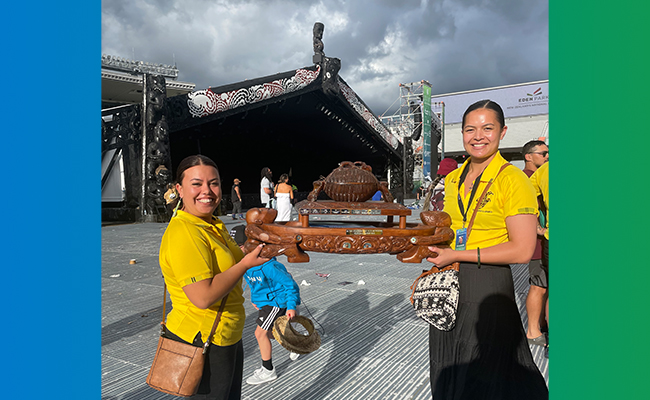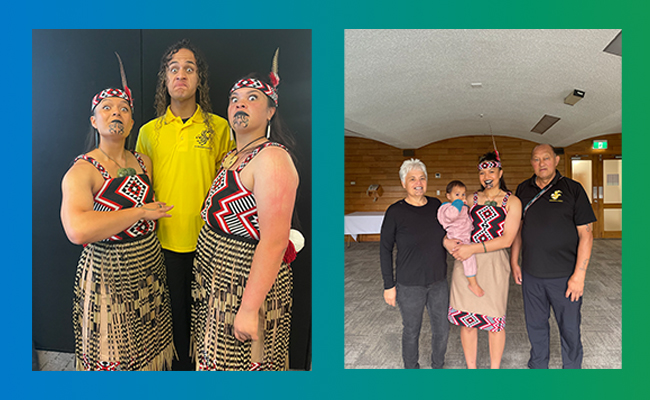
Performing on Te Matatini stage. Top left: Māori Health tauira Hineani Campbell-Collier. Bottom right: Music and Māori studies tauira Tomuri Spicer (left)
University of Otago tauira took centre stage at Aotearoa's most popular Te Matatini to date.
It has been a busy few months for Māori Health tauira Hineani Campbell-Collier (Te Whānau-a-Apanui, Te Whakatōhea, Te Aitanga-a-Māhaki, Ngāi Tahu) and Music and Māori studies tauira Tomuri Spicer (Ngāpuhi, Ngāti Maniapoto, Ngāti Raukawa), who both performed at Te Matatini 2023.
The event is a celebration of kapa haka, bringing iwi from around the country together to compete and be crowned the best kapa in Aotearoa.
Hineani performed with Te Whānau ā Apanui, this year's competition winners, and Tomuri stood with Te Poutūmārō.
Hineani says “the vibe was electric” at the competition after four years of cancellations due to the pandemic.
“I've been to past Matatini's and I feel like this one was on another level.”
Tomuri grew up in the small South Island town of Cheviot and says he was “fizzing” to witness the display of culture present at Te Matatini, his first national kapa haka competition.
"I've never really been up North for longer than a few days before, so to go to Tāmaki Makaurau and just see that Matatini culture for the first time, it was nuts."

Left: Tomuri Spicer backstage at Te Matatini. Right: Tomuri in his competition kākahu with his uncle and aunty.
Preparing for Te Matatini was no small feat, and the pair were forced to be strategic with their time and money as they navigated rehearsals and study.
Tomuri would make the weekly journey from Ōtepoti to Christchurch and even Nelson to attend rehearsals and dug into his own pockets to cover travel expenses.
"Our group, we had some funding, and the kapa's committee supported where it could, but for the most part it was through our own koha.
“It was worth it.”
It was important for Tomuri to be fully present while attending both rehearsals and classes, but he says it was challenging at times.
“Sometimes assignments weren't done as well as I would have liked, sometimes practices didn't go as long as I would have wanted them to, kei te pai, it all worked out.”
For Hineani, it was about “taking things day by day" as she managed to attend all but one rehearsal, which she missed because she had an exam, leading up to the competition.
She would drive three hours each way to attend every weekly rehearsal, and made a point to get ahead of her schoolwork when she could.
Hineani says the experience of watching herself on stage at Te Matatini was something she “couldn't even put into words”.
“It's so buzzy, I'm watching myself on TV performing in my dream team.”

Hineani (right) holding the competition trophy.
Performing at Te Matatini with Te Whānau ā Apanui was a childhood dream realised for Hineani, who had whānau in the team and grew up watching them compete.
“I've always wanted to be a part of that group since I was a little girl.
“I grew up watching their regional and national competitions, wanting to be a part of that team.”
Both performers have been immersed in te ao kapa haka since they were young children.
“Kapa haka has just been a part of my life forever. It's a second nature thing for me,” Hineani says.
She says her favourite aspect of te ao kapa haka is the whanaungatanga shared between performers.
“I like meeting new people and gelling with people you didn't know but are actually related to. Finding those connections.”

Hineani (left) backstage with her brother Rihari and cousin Hinetama. Right: Hineani backstage at Te Matatini her parents and niece.
For Tomuri, kapa haka has always been his “way to be Māori” in a “South Island rural farmie town”.
“You often hear the saying 'my culture is more than a performance', for me, performance was my culture.
“Kapa haka was the extent of my reo and ao Māori. Being Māori wasn't something I fully understood, and so kapa haka was my way to recognise and acknowledge that part of my whakapapa, of my family history.
“It was a chance for me to grow as a tangata whenua, as a person of this land.”
Both tauira are grateful to their whānau for supporting their journey to Te Matatini and are looking forward to a positive year ahead.
Tomuri received a Six60 Scholarship for 2023 and Hineani is set to graduate in December.
Kōrero by Keilah Fox.
